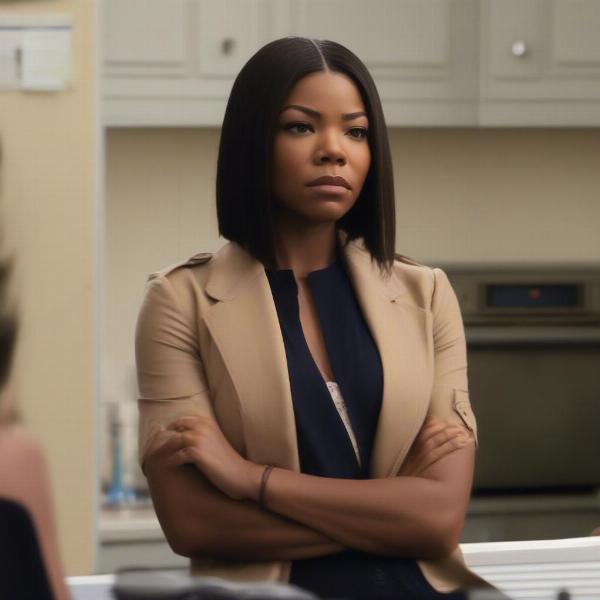Welcome to supremeduelist.blog, where we dissect the strategies and tactics of games, both on and off the digital battlefield. Today, we’re venturing into the complex arena of relationships, using the 2001 romantic comedy “Two Can Play That Game,” starring the charismatic Gabrielle Union, as our case study. This film isn’t just a fun watch, it’s a masterclass in understanding power dynamics and game theory in dating. We’ll be unpacking the rules, the players, and the ultimate strategies employed when the pursuit of love becomes a strategic duel.
This article will delve into the key concepts presented in the movie, analyzing how Gabrielle Union’s character, Shante, navigates the dating world, using wit and calculated moves. We’ll explore the manipulative tactics, the emotional gambits, and the underlying psychology that drives the “game” of romance, as seen through the lens of this iconic film, providing insights valuable to anyone navigating the complexities of modern relationships.
Unveiling Shante’s Strategic Playbook: The Core of “Two Can Play That Game”
At its heart, “Two Can Play That Game” isn’t simply a romantic comedy; it’s a strategic battle played out on the chessboard of love. Shante Smith, played by Gabrielle Union, finds her seemingly perfect relationship on the rocks when her boyfriend, Keith, strays. Instead of wallowing, Shante engages in a calculated plan of action, a series of manipulative tactics designed to win back Keith’s affections and teach him a lesson in the process. The movie portrays how a perceived imbalance of power in a relationship can lead to a “game” where partners vie for control, emotional satisfaction, and ultimately, dominance. We see firsthand how Shante uses her wit, knowledge of Keith’s tendencies, and her network of friends to orchestrate her plan. This goes beyond simple romance; it’s a study in human behavior and strategic decision-making in the social sphere.
The Rules of Engagement: Deciphering Shante’s Tactics
Shante’s methods in “Two Can Play That Game” aren’t just about being mean or cruel, they’re about understanding and exploiting psychological vulnerabilities. She utilizes several key tactics, including:
- Playing Hard to Get: Initially, Shante pretends she’s not bothered by Keith’s indiscretion, making him crave her attention even more. This shows a deep understanding of the psychology behind pursuit and desire.
- Utilizing Social Networks: She strategically leverages her friends as allies, creating a buzz around her independent life, making Keith envious and uncertain.
- Emotional Manipulation: Shante uses targeted emotional strategies, like pretending to move on and enjoy her life, to elicit a reaction from Keith.
- Direct Confrontation and Provocation: When the time is right, she engages in carefully constructed confrontations to highlight Keith’s flaws and test his commitment.
These aren’t necessarily “healthy” relationship strategies, but they highlight a common theme: when communication breaks down, people resort to indirect, often manipulative tactics. It is worth noting that Shante’s “game” works in the film due to the specific context and characters, and may not be advisable in real-life relationships.
 Shante Smith planning revenge
Shante Smith planning revenge
Why the “Game” Works: Understanding the Underlying Psychology
The success of Shante’s plan in “Two Can Play That Game” relies on several underlying psychological principles. Here’s how they play out:
- Scarcity Principle: By initially withdrawing, Shante increases her desirability in Keith’s eyes. We often value things more when they seem less available.
- Social Proof: When Keith sees Shante’s friends admiring her and her independent lifestyle, he perceives her as having higher social value. We tend to value what others value.
- Loss Aversion: Keith becomes more determined to win back Shante when he perceives he is losing her. People feel the pain of loss more keenly than the pleasure of gain.
- Cognitive Dissonance: Keith struggles with the conflicting thoughts of having hurt Shante and wanting her back. This internal conflict makes him more susceptible to her manipulation.
According to Dr. Evelyn Reed, a relationship psychologist, “The dynamics in ‘Two Can Play That Game’ showcase the negative effects of a lack of direct communication. Instead of open dialogue, the characters rely on strategic manipulation, which, while entertaining, doesn’t build healthy relationships.” This highlights the importance of communication over games in maintaining healthy, lasting relationships.
Beyond the Film: Applying Lessons to Real-Life Relationships
“Two Can Play That Game,” while a comedy, provides us with a valuable lens through which to analyze relationship dynamics. While we don’t advocate adopting Shante’s exact tactics, we can learn crucial lessons from her strategic approach. Here are some key takeaways:
- Recognize Power Dynamics: Every relationship has a power dynamic, and understanding it is important. It’s about knowing when your needs aren’t being met and finding a healthy way to address them.
- Effective Communication is Key: The film highlights what happens when people don’t openly communicate, leading to manipulation and games. Prioritize direct communication of your needs and feelings.
- Know Your Own Worth: Shante’s strategy is fueled by her self-worth. We should never settle for treatment that does not respect our value.
- Don’t Play Games: While the film is entertaining, relationships shouldn’t be a battleground. Focus on building trust, intimacy, and open communication.
Navigating Relationship Challenges Without Resorting to Games
Instead of “playing games” like Shante, here’s how you can navigate common relationship challenges in a more constructive manner:
- Identify the Problem: Pinpoint the exact issue causing distress. Is it lack of communication, jealousy, or something else?
- Communicate Openly: Express your feelings and needs to your partner without blame. Use “I” statements.
- Listen Actively: Be present and truly listen to your partner’s perspective, understanding their side of the story.
- Find Solutions Together: Work collaboratively to find solutions that satisfy both your needs.
- Seek Professional Help: If communication is persistently difficult, consider seeking therapy with a couples counselor.
“Sometimes,” says Dr. Marcus Chen, a couples counselor, “the very act of labeling a conflict as a ‘game’ can be destructive, hindering the open communication that is essential for healthy partnerships. Instead, couples should focus on teamwork and mutual understanding.”
 Couple talking honestly
Couple talking honestly
Frequently Asked Questions About “Two Can Play That Game”
What is the main message of “Two Can Play That Game?”
The main message is not about advocating for manipulative tactics in relationships. It highlights how a lack of communication can lead to dysfunctional dynamics, showcasing the potential negative consequences of playing games instead of engaging in honest conversations.
Is Shante’s approach in the film a healthy way to resolve relationship issues?
No, Shante’s approach is not a healthy way to resolve relationship issues. While her plan is clever and entertaining, it is based on manipulation and avoidance of direct communication, which is not conducive to building healthy partnerships.
What are some better strategies for addressing relationship issues than playing games?
Better strategies include open and honest communication, active listening, empathy, and finding solutions together. If needed, seeking professional guidance from a therapist or counselor is also recommended.
How does “Two Can Play That Game” portray the psychology of romantic relationships?
The movie uses the narrative of Shante’s “game” to showcase the psychological concepts of scarcity, social proof, loss aversion, and cognitive dissonance, as well as highlighting the power dynamics inherent in romantic relationships.
What can modern viewers learn from “Two Can Play That Game?”
Modern viewers can learn the pitfalls of indirect communication and manipulation, while appreciating the importance of self-worth and knowing when your needs aren’t being met. The movie serves as a cautionary tale against playing “games” in relationships.
Concluding the Game: A Focus on Healthy Relationships
“Two Can Play That Game” serves as an entertaining, albeit cautionary, tale about the complexities of romantic relationships. While Shante’s strategic maneuvering is compelling, it underscores the importance of direct communication and honesty over manipulation and playing games. Ultimately, the real win in any relationship lies in mutual respect, empathy, and a shared commitment to open dialogue. Here at supremeduelist.blog, we encourage you to apply these principles in your own relationships, choosing communication over calculated moves. Remember that the healthiest and most rewarding relationships are built on trust and understanding, not games. We hope this analysis has helped you gain a new perspective. For more relationship insights, and other game-related analysis, stay tuned to supremeduelist.blog!
Leave a Reply